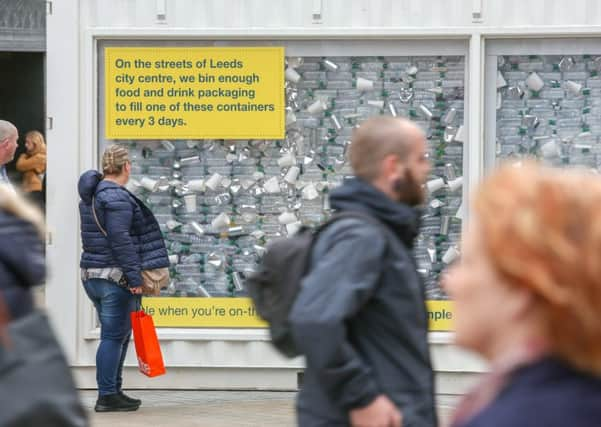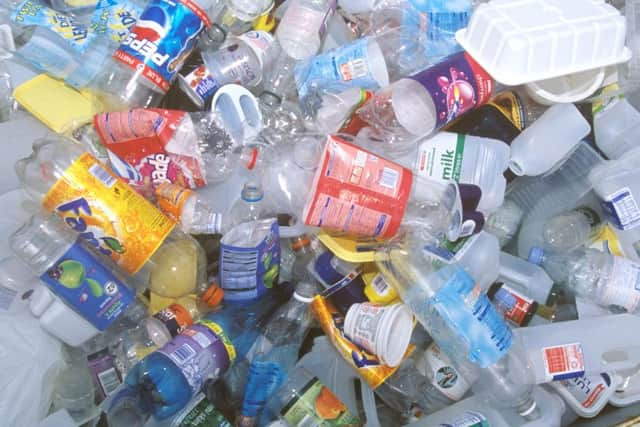Plastic waste is one of the scourges of our time - but are we doing enough to tackle it


Nothing sums up the modern age more than plastic. It is almost everywhere you look, having crept insidiously into every corner of life, sometimes unexpectedly.
Think car tyres are made from natural rubber? Not any more, nearly all are a type of plastic made from oil not trees. Annoyed by those little paper stickers they now put on individual pieces of fruit? Actually, they are usually plastic – try tearing one. But at least a good honest tea-bag must be all-natural? No, not always – manufacturers often add a little plastic to strengthen them. The list is endless.
Advertisement
Hide AdAdvertisement
Hide Ad

Plastics – and there are many types – may be very useful, providing cheap packaging in particular, but as we now realise even plastic bags can take hundreds of years to decompose. Pretty much all the plastics we have ever made, bar what we have perhaps ill-advisedly burned, remain with us. And as time passes, more and more escapes into the wider environment, littering towns and countryside and spreading out across the globe.
It is estimated that 8 million tonnes of plastics gets into the oceans each year, killing millions of birds, fish and other marine organisms through entanglement or through clogging up their intestines. Eventually, plastic items smash into smaller pieces, wear down into finer particles or shed their fibres becoming micro-plastics, harder to see but still there and with long-term impacts we can only begin to guess at.
Advertisement
Hide AdAdvertisement
Hide AdJulian Kirby is a campaigner at Friends of the Earth. “Plastic pollution is something we’ve come to realise is a big problem fairly late in the day. Programmes like Blue Planet II have woken us up not just to the harms of pollution but also to how wastefully we use plastics,” he says.
According to Friends of the Earth, around a third of plastic waste in Europe is currently sent for recycling, another third goes into incinerators – something it says amounts to burning fossil fuels in the least efficient and dirtiest way imaginable – and the final third ends up in landfill or, indeed, our surroundings.
Councils vary greatly in their environmental efforts. Yorkshire’s local authorities are evenly spread across the recycling league table of 345 councils in England. The best council in the country for dealing with waste in 2017-2018 was East Riding of Yorkshire, which sent 64.5 per cent of its total household waste for reuse, recycling or composting.
The figure for Leeds Council was 38.4 per cent, however it is shortly to take over a ground-breaking recycling scheme that has been running in the city since last year. Leeds By Example was set up by the Hubbub Foundation to tackle a growing problem – waste produced by on-the-go lifestyles. Each year millions of plastic drinks bottles, as well as drinks cans and coffee cups, are disposed of outside the home or workplace across the nation. Leeds By Example introduced over 120 recycling points in the city centre, using fun messaging and even rewards to encourage people to dispose of items properly. In the first six months, 55,000 plastic bottles were collected.
Advertisement
Hide AdAdvertisement
Hide AdPeople have become aware though that a lot of recycling is sent abroad for processing and not always very successfully. “Two-thirds of plastic waste collected for recycling in the UK,” says Kirby, “is exported with little if any audit to ensure it is properly and safely recycled.” Friends of the Earth has sent an investigator to Indonesia, where much of our waste now ends up, where she found mountains of our plastics just dumped in villages and forests. The organisation argues the UK must build more reprocessing capacity here. That way we really can be sure that what we throw into our recycling bins does get recycled.
But not all plastics can realistically be recycled and recycling itself is not a magic wand. “Recycling is a good thing,” says Kirby, “but not the best good thing.” Indeed, recycling of plastics is expensive, complicated and energy-intensive, while the resulting product is usually of lower quality than what was started out with.
“Plastics have become synonymous with single-use and a throwaway culture. The Government needs to steer us away from simply recycling plastics to reusing them or even doing away with them in the first place.”
Advertisement
Hide AdAdvertisement
Hide AdOne answer to the explosion in plastic packaging is presented by the Danish company Maistic, which produces food and waste bags made from plant material. Although known as bioplastic, it can be composted after use. Nevertheless, it still represents that throwaway society.
A recent report by Parliament’s Environment, Food and Rural Affairs Select Committee confirms this line of thinking, arguing we have to move away from all single-use packaging towards reuse and refill schemes.
And good things are already happening. The organisation WRAP has invited manufacturers, retailers and others to join its UK Plastics Pact, whereby members pledge to eliminate eight problem items by the end of 2020. These include polystyrene packaging and disposable plastic cutlery. Signatories also adopt plans to cut use of other plastics by 2025. Tesco, Sainsbury’s and Yorkshire-based Morrisons are among the 130-odd who have signed up so far.
In the retail sector, however, the pace is being set more by independent stores such as Keelham Farm Shop at Skipton. Twelve months ago plastic bags were almost completely removed from the fresh produce section. Fruit and vegetables are now available in paper bags, paper punnets or loose. Victoria Robertshaw is the chief executive of Keelham’s. “We are trying to take out as much plastic as we can,” she says. “We are on a mission.”
Advertisement
Hide AdAdvertisement
Hide AdKeelham’s is particularly proud of achieving what it calls “naked” cucumbers – an item hitherto almost unthinkable without the ubiquitous plastic shrink-wrap, something it perhaps never really needed. Over in the bakery, bread is sold in paper bags too, while behind the butcher’s counter, plastic bags are set to disappear over the next few weeks with customers encouraged to take in their own containers. Hard-to-recycle polystyrene and black plastic trays set to go completely. Meanwhile, beeswax paper can be bought to wrap cheese in.
Taylors of Harrogate, maker of Yorkshire Tea, aims to make all its teabags plastic-free by the end of the year. Ben Newbury from the company explains: “We’ve been working on this for a while and it hasn’t been without its challenges. We want our environmental impact to be positive and we have lots of changes coming over the next few years.”
Removing plastics from teabags might seem a small step but one less storm in a teacup is part of the colossal change that is needed if we are to succeed in putting the genie that is plastics firmly back in its bottle.
How can we make a difference?
Refuse, reduce, reuse and recycle plastic packaging, in that order.
Advertisement
Hide AdAdvertisement
Hide AdThink multi-use plastic containers rather than single-use plastic bags. Refill your water bottle with tap water and save money too.
Take a reusable cup for coffee on the go. Buy a bag-for-life for shopping. If you must use a ‘plastic bag’, go for bioplastic and compost it at home or through your council’s food waste collection, if you have one.
Ask retailers to cut their use of plastics now.
Press decision-makers – MPs, mayors and councillors – to set pathways towards reduction of plastics.
Talk about things – start a conversation about plastics and help drive change.